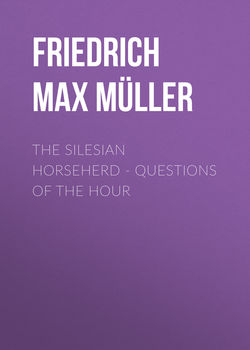The Silesian Horseherd. Questions of the Hour

Реклама. ООО «ЛитРес», ИНН: 7719571260.
Оглавление
Friedrich Max Müller. The Silesian Horseherd. Questions of the Hour
Preface
Chapter I. The True History Of Celsus
Chapter II. The Pferdebürla (Horseherd)
Chapter III. Concerning The Horseherd
Chapter IV. Language And Mind
Chapter V. The Reasonableness Of Religion
Chapter VI. Conclusion
Отрывок из книги
The following essays, which were intended primarily for the Horseherd, but which were published in the Deutsche Rundschau, demand a short explanatory introduction. This, I believe, can best be given by me, by means of a reprint of another essay which appeared in the same periodical, and was the direct cause for the letter, which the writer, under the name of “Horseherd,” addressed to me. I receive many such anonymous communications, but regret that it is only rarely possible for me to answer them or to give them attention, much as I should like to do so. In this particular case, the somewhat abrupt, but pure, human tone of the letter appealed to me more than usual, and at my leisure I attempted an answer. My article, which called forth the letter of the Horseherd, was entitled “The ‘True History’ of Celsus,”5 in the July number of the Deutsche Rundschau, 1895, and, with a few corrections, is as follows:—
In an article which appeared in the March number of the Deutsche Rundschau, 1895, entitled “The Parliament of Religions in Chicago,” I expressed my surprise that this event which I had characterised as in my opinion the most important of the year 1893, had been so little known and discussed in Germany—so little, that the editors of the Wiener Fremdenblatt thought it needful to explain the nature of the Chicago Congress. Likewise, when in answer to the question as to what I should consider the most desirable discovery of the coming year in my department, I answered the discovery of the Sermo Verus of Celsus; this, too, appeared to be a work so little known, that the editors considered it necessary to add that Celsus was a renowned philosopher of the second century, who first subjected the ever spreading system of Christianity to a thorough criticism in a work entitled Sermo Verus. The wish, yes, even the hope, that this lost book, of which we gain a fair idea from the reply of Origen, should again make its appearance, was prompted by the recent discoveries of ancient Greek papyrus manuscripts in Egypt. Where so many unexpected discoveries have been made, we may hope for yet more. For who would have believed that ancient Greek texts would be found in a mummy-case, the Greek papyrus leaves being carelessly rolled together to serve as cushions for the head and limbs of a skeleton? It was plain that these papyrus leaves had been sold as waste paper, and that they were probably obtained from the houses of Greek officials and military officers, who had established themselves in Egypt during the Macedonian occupation, and whose furniture and belongings had been publicly sold and scattered on occasion of their rapid withdrawal. There were found not only fragments of classical texts, as of Homer, Plato, and the previously unknown treatise on “The Government of the Athenians,” not, perhaps, composed, but utilised, by Aristotle, but also many fragments of Christian literature, which made it probable that the libraries of Christian families also had been thrown on the market, and that papyrus leaves, when they appeared useless for any other purpose, were used as waste paper, or as a kind of papier-maché.
.....
But this is just what he ought not do. It was not necessary to translate it at all; he only needed to accept the Logos as a technical expression of Greek philosophy. He would then have seen that it is impossible to prize the Word too highly, if we first learn what the Word meant in the idiom of contemporary philosophy. Not even to a Faust should Goethe have imputed such ignorance as when he continues to speculate without any historical knowledge:—
Had Goethe wished to scourge the unhistorical exegesis of modern theologians, he could not have done so better than by this attempt of an interpreter of the Bible, fancying himself illumined by the spirit, but utterly destitute of all knowledge of history. Knowledge of the history of the Greek philosophy of the first and second centuries after Christ is indispensable to the understanding of such a word as Logos—a word that grew up on Greek soil, and whose first roots reach far into the distant past of the Greek mind; and for that very reason not admitting of translation, either into Hebrew or into German. Like many other termini technici, it must be understood historically; just as logic, metaphysic, analytic, organon, etc., can only be apprehended and understood historically. Now it is, perhaps, not to be denied, that even now a majority of educated readers either perfunctorily repeat the first sentence of the Fourth Gospel, “In the beginning was the Word,” or believe that something lies buried therein that is beyond the depth of ordinary men. This, of course, is partially true, and it cannot be otherwise in religions which are intended not only for the young, but for the wise and learned, and which should be strong meat for adults, and not merely milk for babes. The fault lies chiefly in the translation, in that it should have been thought necessary to translate a word instead of permitting it to remain, what it was, a foreign word.
.....